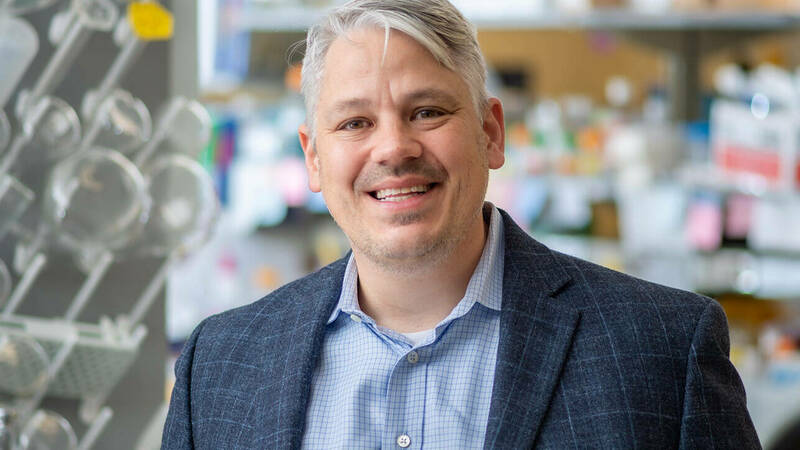
Matthew Champion
Associate Professor
- Office
- 140B Mccourtney Hall
Notre Dame, IN 46556 - Phone
- +1 574-631-1787
- mchampio@nd.edu
Research Areas
- Biochemistry
- Physical/Analytical Chemistry
Research Specialties
- Life Processes
- Measurement
Prospective Graduate Students
Biography
| Year | Title |
|---|---|
| 2019-present | Associate Professor, University of Notre Dame |
| 2015-2019 | Research Associate Professor, University of Notre Dame |
| 2009-2015 | Research Assistant Professor, University of Notre Dame |
| 2003-2009 | Applied Biosystems (AB Sciex), Mass-Spectrometry-Proteomics Group |
| 2005 | Ph.D. in Biochemistry, Texas A&M University |
| 1997 | B.S. in Microbiology, University of Iowa |
Research Interests
The Champion group is primarily interested in developing and exploiting novel approaches to identify and characterize the components of secreted proteins from virulent microorganisms. We heavily utilize the 'awesome power of genetics' coupled with state-of-the art quantitative proteomics to enrich, identify and quantify the proteins responsible for biological phenotypes. We have ongoing projects in pathogenic mycobacteria, protein translation in E. coli through the PTRN, and quantitative protein secretion measured using capillary electrophoresis. One example is described below.
Mycobacteria, the causative agent of tuberculosis, like most organisms secretes proteins for biochemical functions. Secreted proteins are a proteome of 'target'-enriched material which contains virulence-factors, antigenic-determinants, and targets for treatment/detection. EsxA and EsxB (ESAT-6 and CFP10) are essential virulence factors exported by mycobacteria and other Gram positive pathogens. Identification of proteins that are required for effective synthesis and secretion of these crucial virulence determinants has been hindered by a lack of saturating genetic screens; high-throughput biochemical detection, and accurate quantification of disease phenotypes. We designed orthogonal antibody-free assays using a slew of proteogenetic approaches to comprehensively dissect the individual contribution of gene products towards a functioning disease secretion system (ESX-1) in pathogenic mycobacterium. This framework is highly extensible to the analysis of other pathogen and protein secretion systems, and has uncovered novel genes, pathways, and crosstalk among secretion systems.
Selected Publications
- Hu, D. D.; Weaver, S. D.; Collars, O. A.; Champion, P. A. and Champion, M. M. "N-Terminal Proteomics of Mycobacterium Marinum using Bottom-Up Label-Free Quantitative Analysis in Data-Dependent Acquisition Mode on a timsTOF Pro Mass Spectrometer" 2024 Microbiology Resource Announcements, 13 (4), e01263-23. DOI: 10.1128/mra.01263-23.
- Lundgren, T. J.; Clark, P. L. and Champion, M. M. "Fit for Purpose Approach to Evaluate Detection of Amino Acid Substitutions in Shotgun Proteomics" 2024 Journal of Proteome Research, 23 (4), pp.1263-1271. DOI: 10.1021/acs.jproteome.3c00730.
- Nicholson, K. R.; Cronin, R. M.; Prest, R. J.; Menon, A. R.; Yang, Y. W.; Jennisch, M. K.; Champion, M. M.; Tobin, D. M. and Champion, P. A. "The Antagonistic Transcription Factors, EspM and EspN, Regulate the ESX-1 Secretion System in M. Marinum" 2024 Mbio, 15 (4), e03357-23. DOI: 10.1128/mbio.03357-23.
- Huge, B. J.; Kerr, C. M.; Wanigasinghe, S.; Champion, M. M. and Dovichi, N. J. "Optimized Sample Buffer for Dispersed, High-Resolution Capillary Zone Electrophoretic Separation of Escherichia Coli B" 2023 Scientific Reports, 13 (1), 22269. DOI: 10.1038/s41598-023-49669-y.
- Nandana, V.; Rathnayaka-Mudiyanselage, I. W.; Muthunayake, N. S.; Hatami, A.; Mousseau, C. B.; Ortiz-Rodríguez, L. A.; Vaishnav, J.; Collins, M.; Gega, A.; Mallikaarachchi, K. S.; Yassine, H.; Ghosh, A.; Biteen, J. S.; Zhu, Y. X.; Champion, M. M.; Childers, W. S. and Schrader, J. M. "The BR-Body Proteome Contains a Complex Network of Protein-Protein and Protein-RNA Interactions" 2023 Cell Reports, 42 (10), 113229. DOI: 10.1016/j.celrep.2023.113229.
- Avila-Cobian, L. F.; Hoshino, H.; Horsman, M. E.; Nguyen, V. T.; Qian, Y. Y.; Feltzer, R.; Kim, C.; Hu, D. D.; Champion, M. M.; Fisher, J. F. and Mobashery, S. "Amber-Codon Suppression for Spatial Localization and in Vivo Photoaffinity Capture of the Interactome of the Pseudomonas Aeruginosa Rare Lipoprotein A Lytic Transglycosylase" 2023 Protein Science, 32 (10), e4781. DOI: 10.1002/pro.4781.